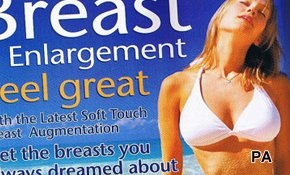Alcohol, gambling…cosmetic surgery? 63% say surgery should not be able to advertise; 31% should
Cigarettes, gambling, payday loans, abortion providers, prescription drugs and debt finance solutions should not be allowed to be advertised on television, say the majority of British adults, but other potentially controversial subjects, such as alcoholic drinks, political parties, fast food and laser surgery providers should be allowed to advertise in this way, our poll on the issue has found.
- 79% say that cigarettes shouldn't be allowed to be advertised on television
- Payday loans (75% said that they shouldn't be allowed), gambling (73%), personal injury lawyers (65%) and cosmetic surgery providers (63%) were almost as unpopular when it comes to TV advertising
- 63% say that abortion providers should not be allowed to advertise on TV
- While 54% apiece would ban TV adverts for prescription drugs and debt refinancing companies
- Opinions on whether alcoholic drinks should be allowed were more split, but just slightly more people would allow them (50%) than disallow them (44%)
- Similarly, a slim majority of Britons would allow laser surgery providers (54% would allow), political parties and candidates (58% allow, 36% disallow), and fast food companies (61% allow, 33% disallow) to advertise
- Most accepted in the TV advert stakes were children's toys, which just 15% would ban from TV advertising compared to 79% who would allow it, and 11% who think Universities shouldn't be allowed to have TV advertising, compared to 84% who think they should
TV adverts – what's acceptable?
The results come in light of the recent call from The British Association of Aesthetic Plastic Surgeons (BAAPS) that the advertising of cosmetic surgery procedures, such as breast enlargements, should be banned ‒ prompting debate over what advertising content should be permissible on television.
Clearly, many of the products we asked panellists about are already highly regulated or banned from television advertising in the UK, including alcohol, tobacco products, prescription drugs and gambling – and most respondents did agree that these services should indeed be banned.
Stringent rules exist where it is judged that young people may be influenced by TV adverts, such as those for alcohol products, while television advertising of tobacco products is banned under the Tobacco Advertising and Promotion Act of 2002.
Advertising of medical products which are 'likely to lead to the use of a prescription only medicine' are also banned in the UK – but this does not cover many cosmetic surgical procedures, prompting BAAPS to call for tighter regulation of the industry.
Making surgery a commodity?
BAAPS president and plastic surgeon, Fazel Fatah has said: 'In no other area of surgery would one encounter Christmas vouchers and two-for-one offers…You don’t see adverts for metal hip replacements or gall bladder operations. Advertising in cosmetic surgery feeds into the worries and insecurities in a group of vulnerable people.'
However, Dr Eamonn Butler of the Adam Smith Institute has pointed out that advertising is not the problem, because 'people do not make decisions on the strength of an advertisement alone. The advertisement alerts them to the options, then they root out the information they need.'
But Fatah compares cosmetic surgery advertising to other medicines, and was adamant that 'it is amazing that while prescription medicines cannot be advertised in magazines, invasive surgical procedures can be. These clinics have turned surgery into a commodity and that is wrong.'
See the survey details and full results here









